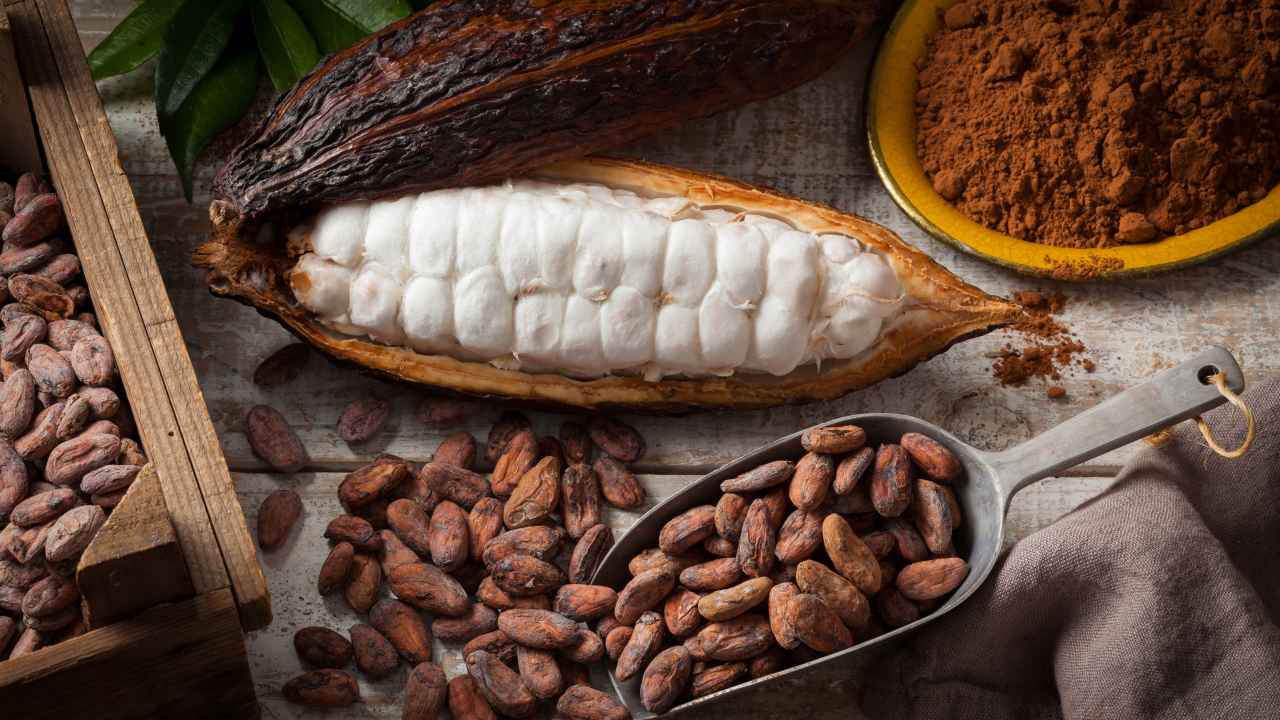Cocoa is the dried and fully fermented seed of Theobroma cacao, from which cocoa butter (the fat) and cocoa solids can be extracted. Cocoa is the seed of the cacao tree. The seed contains a lot of fat, and is used to produce cocoa butter, which is then used to produce chocolate. Cocoa beans are the main source of commercial cocoa. Cocoa beans are often used in the food, pharmaceutical, and cosmetics industry.
Consumption of cocoa-rich products provide various health benefits such as lower the risk of chronic fatigue syndrome and cardiovascular disease, and reduce hypertension. Cocoa powder is rich in theobromine, which helps to reduce inflammation and can protect from diseases such as diabetes, cancer, and heart disease.
Cocoa is the seed of a tropical fruit tree called Theobroma cacao, that’s native to South America and first domesticated by the Olmecs in southern Mexico. It was then spread by the Mayans and Aztecs. Today the crop is primarily grown in West Africa and Central America, as well as in areas within 20° of the Equator. Cacao beans are the raw material for all the cocoa products, including chocolate bars, hot chocolate, and cocoa powder.
The cocoa market is a significant global industry, driven by consumer demand for chocolate products. Key cocoa-producing countries include Ivory Coast, Ghana, and Indonesia. Price fluctuations often occur due to weather conditions, disease outbreaks, and geopolitical factors. Sustainability efforts aim to address ethical and environmental concerns in cocoa farming. According to Coherent Market Insights, the Global Cocoa Market is projected to reach around us$ 15,065.0 million by the end of 2027, in terms of revenue, growing at CAGR of 3.4% during the forecast period (2020-2027).
The seeds are contained in pod-shaped fruits that cling to the trees. Farmers harvest the pods, scoop out the seeds and ferment them to develop their flavor. The beans are then dried and shipped to factories worldwide. In the factory, manufacturers grind and press the beans to extract the liquid chocolate liquor.
They may add sugar and other ingredients, then heat and mix it to make the finished cocoa products we eat. The resulting powder has a fine consistency that blends well with batters as well as other dissolvable mixtures, making it a popular choice for the baked goods. It can be sweet and/or bitter depending on the roast and processing, and it comes in a variety of cocoa percentages. Some are made from heirloom varieties that offer a more intense, natural taste and others use only high-quality beans to ensure consistent results. Kosher cocoa powder is available for those who need it, and organic blends are popular among health-conscious consumers.
Aside from its delicious taste, there are several other reasons people love cocoa powder, its low in calories and a source of flavonoids, which have been linked to cardiovascular health and lowered cholesterol levels. A number of studies have shown that cocoa can reduce inflammation. In one study, researchers found that consumption of cocoa reduced the levels of inflammatory markers and HDL cholesterol in healthy people. The effect of cocoa on lipids was not replicated in vivo, but their results are encouraging. Furthermore, the research also confirmed the role of flavonoids in reducing the risk of diabetes and heart disease. So, cocoa has many benefits. But be careful when purchasing cocoa powder: not all brands are created equal.
The nutritional value of cocoa is significant. The moderate amount of chocolate each day can help lower blood pressure and prevent thrombosis. It also boosts the immune system. Studies show that consumption of cocoa lowers the risk of cardiovascular diseases, other studies suggest it protects against diabetes and high blood pressure. But the effect of cocoa on human health is not as clear as that of coffee and tea. Eating cocoa is usually safe for most people. However, cocoa contains caffeine and related chemicals. Thus, eating large amounts of cocoa powder might cause caffeine-related side effects such as a fast heartbeat, sleeplessness, increased urination, and/or nervousness. Moreover, cocoa may cause allergic skin reactions and trigger migraine in some people. It can also cause gas, nausea, stomach discomfort, and constipation.
According to the European Food Safety Authority, the recommended daily intake value of high-flavanol cocoa powder is 0.1 ounces (2.5 grams). In simple words, one shouldn’t consume more than four to six teaspoons of raw cocoa in a day.


3 responses to “Cocoa; a Powder Made From Roasted, Husked, and Ground Seeds of Theobroma Cacao”
Metal scrap analysis Ferrous material environmental impact assessment Iron and steel recovery
Ferrous material agreements, Iron waste drop-off, Metal treatment services
Scrap metal processing Ferrous material waste recycling technology Iron and steel scrapping and recycling yard
Ferrous recycling yard, Iron scrap cleaning, Metal scrap reclamation and utilization
order lipitor 80mg generic brand lipitor buy atorvastatin 20mg without prescription